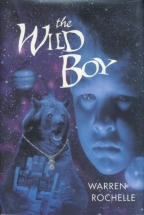The Wild Boy
Warren Rochelle
Golden Gryphon Press
US Trade Hardcover
ISBN 1-930846-04-5
Publication Date: 2001
260 Pages; 22.95
Date Reviewed: 06-06-02
Reviewed by Rick Kleffel © 2002

REFERENCES
COLUMNS
|
|
|
The Wild BoyWarren RochelleGolden Gryphon PressUS Trade HardcoverISBN 1-930846-04-5Publication Date: 2001260 Pages; 22.95Date Reviewed: 06-06-02Reviewed by Rick Kleffel © 2002 |
|
|
REFERENCES |
COLUMNS |
One of the reasons readers enjoy science fiction is that it can cover a lot of ground. From the meta-fictional musings of Stanislaw Lem to the nuts-and-bolts hard science fiction of Gregory Benford, the genre offers an infinite number of springboards for great writing. In 'The Wild Boy', Warren Rochelle offers something of a return to what many would consider the "roots" of science fiction -- the alien invasion of earth. It worked for H. G. Wells and it sure as heck works for Rochelle. Published by Golden Gryphon Press, a small press mostly noted for their fabulous short-story collections, it slipped by the usual reader radar. At a time when the ubiquity of computers threatens to turn all science fiction into cyber-something, 'The Wild Boy' manages to neatly sideline the whole topic. In a publishing landscape where the unnecessary sex scene has crossed over the Bridge of Groans and into the background noise, 'The Wild Boy' is able to approach sex as if it were completely new. While other writers seek to satisfy readers with Big Action, Rochelle manages to satisfy readers with Big Ideas. 'The Wild Boy' is a throwback to a time before science fiction dominated the movie screens.
Rochelle's setup is simple. The Lindauzi, an ursine alien race, have arrived on Earth to domesticate humans and turn them into empathic companions. The invasion takes place on the Millennium, but the majority of the story is set 155 years later. Humans are now called dogs; they serve as slaves for the technically superior Lindauzi, if they're not being bred as companions or pets. Ilox is a human bred by the Lindauzi for empathic bonding with Phlarx, the rather dim son of Ilox's owner. He is the result of 155 years of breeding and gene splicing, the grand Project of the Lindauzi race. He's a success -- his bond with Phlarx is all the Lindauzi have planned for. What they did not plan for was his intelligence and individuality, his ability to learn of the time before the Lindauzi arrival. He escapes, and fathers Caleb, a 'wolf', a wild boy living in the remains of an American city outside the control of the aliens. But the empathic bond forged by the Lindauzi too strong, and Ilox returns to Phlarx. Caleb is captured by the Lindauzi. The son will find the father.
While the setup may be simple, the narrative is anything but. Rochelle's prose is largely transparent, illuminating the inner world of his humans and aliens. The Lindauzi mature more slowly than humans; moreover, Phlarx is not the brightest of the breed. As he grows to maturity, Ilox finds himself outpacing Phlarx intellectually. But the emotional bond is strong. Rochelle creates a complex alien society with complete ease. He keeps his writing skills in the background and his characters and ideas in the foreground. Basic human behavior under the Lindauzi is utterly transformed. Humans are bred, and families are unknown -- as they are in Lindauzi culture. As Ilox discovers the human norm and then experiences it in the wild, his view is slowly transformed into something more akin to the reader's experience of societal norms. Rochelle does a fantastic job at showing the reader how everything we take for granted as natural -- families, the bond of love between humans who mate -- could be easily obliterated by a couple of generations of breeding and lots of killing. He does well what science fiction does best -- he shows us ourselves from the point of view of humans who have become essentially aliens.
Rochelle doesn't shy away from the big questions either. Love, sex, genocide, a society in decay -- Rochelle speaks intelligently and passionately on all of these topics, through the lives and experiences of his characters. Of course, it's the characters that make this novel. Ilox, Phlarx and Caleb are all carefully, craftily drawn. The alien culture is nicely constructed, and I was glad to see some pronounceable names. The plot is straightforward, but Rochelle winds up the suspense as the narrative draws to a close. He also presses some real big buttons with great success, making the reader realize the virtues of well-written science fiction. Thought provoking is just a beginning.
As with many tales of more social science fiction, for the most part you're not in a rocket ship race against death. You'll notice an absence of spurious scenes of sex and violence. For some readers, this may translate into slower reading. The rewards of Rochelle's novel are not in scenes of fantastic action, but in the tapestries of characters caught in upside-down logic and societal inversion. Quietly, with precision, Rochelle takes the reader down a path trod by writers such as Ursula K. Leguin, about whom he has written a non-fiction work. 'The Wild Boy' suggests that he'd be well advised to continue his career in fiction, and that he could give the subject of his non-fiction work a run for the reader's money. It's money well spent in my book.